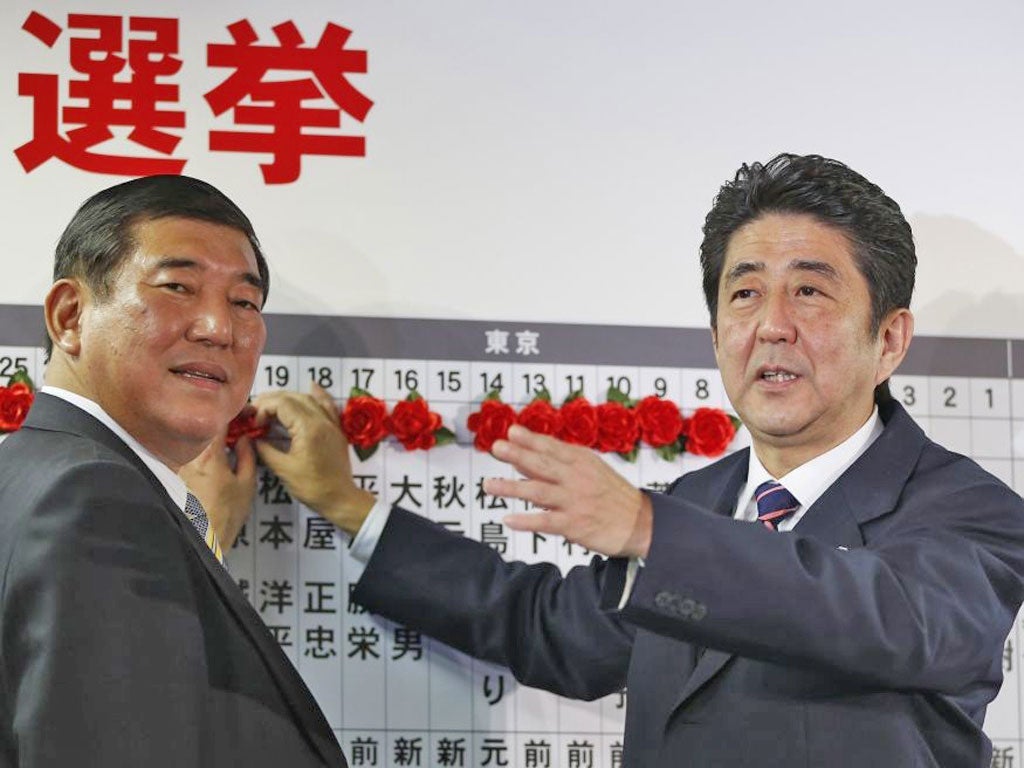Asian neighbours nervous after election comeback for Japanese 'warmonger'
LDP leader Shinzo Abe vows to challenge the pacifist constitution and spend on defence

Your support helps us to tell the story
From reproductive rights to climate change to Big Tech, The Independent is on the ground when the story is developing. Whether it's investigating the financials of Elon Musk's pro-Trump PAC or producing our latest documentary, 'The A Word', which shines a light on the American women fighting for reproductive rights, we know how important it is to parse out the facts from the messaging.
At such a critical moment in US history, we need reporters on the ground. Your donation allows us to keep sending journalists to speak to both sides of the story.
The Independent is trusted by Americans across the entire political spectrum. And unlike many other quality news outlets, we choose not to lock Americans out of our reporting and analysis with paywalls. We believe quality journalism should be available to everyone, paid for by those who can afford it.
Your support makes all the difference.Three years after being dumped from power and written off by some as a political force, Japan's conservative Liberal Democrats have scored a remarkable electoral comeback in a victory with potentially ominous implications for the rest of Asia.
With votes still being counted from today's general election, the LDP was projected to win control of the 480-seat lower house with coalition partner New Komeito.
The hawkish LDP leader Shinzo Abe, who has pledged to revive Japan's stagnant economy and aggressively defend its territorial interests, is now certain to become the nation's next Prime Minister – its seventh in six years.
The LDP's liberal-left rival, the Democratic Party, was pummelled at the polls for breaking electoral promises on welfare, tax and defence, shedding more than 200 seats. The Prime Minister, Yoshihiko Noda, who lost much of his public support by backing a tax rise and supporting nuclear power, conceded defeat last night.
Mr Abe wants to boost spending on public works and restart Japan's nuclear reactors, most of which are idling in the wake of last year's Fukushima nuclear disaster. His remedy for the economy, which is sliding into its fifth recession in 15 years, involves forcing the nation's central bank to buy billions of yen in special government bonds. "What's first and foremost is to achieve an economic recovery and pull Japan out of deflation," he told a television station last night.
But it is his foreign policy views that worry some in Asia. Mr Abe has repeatedly pledged to challenge Japan's pacifist constitution and increase defence spending, a strategy likely to anger China and South Korea. The China Daily has dubbed him a "warmonger with dangerous designs".
In campaign speeches, he dwelt on deteriorating Sino-Japanese ties, which have soured over a bitter territorial dispute. "Japan's beautiful seas and its territory are under threat," he said this month. "I promise to protect Japan's land and sea, and the lives of the Japanese people no matter what."
Mr Abe is part of a group of conservative politicians who believe Japan must end what they see as national self-flagellation about the nation's war record. After he took over leadership of the LDP in October, he made a pilgrimage to Yasukuni Shrine in Tokyo, which is dedicated to Japan's Second World War leaders, including convicted war criminals, along with more than two million ordinary soldiers.
Many analysts predict, however, that Mr Abe will tread carefully while in office to avoid friction with the US. Japan's media says Washington, which is committed to defending Japan if it comes to blows with China over the disputed Senkaku/Daioyu islands, has already made it clear that it wants both sides to tone down the heated rhetoric of the past few months.
The Buddhist-backed New Komeito, has confirmed that it is willing to form a coalition government, but the LDP has not ruled out co-operating with the right-wing Japan Restoration Party, set to win about 45 seats. An LDP/Restoration government is likely to take a harder line on foreign policy.
It will be Mr Abe's second stint as Japan's leader. His previous 12 months in office in 2006-07 were consumed by his passion for rebuilding what he famously called a "beautiful Japan". In practice that meant a botched attempt to scrap the war-renouncing constitution and a distracting campaign to deny Japan's involvement in rounding up thousands of sex slaves during the war.
He left office after a fierce battering from the media, complaining of a stress-induced digestive disorder that forced him to miss parliamentary sessions for repeated trips to the toilet. Mr Abe will be confirmed as Prime Minister on 26 December.
Join our commenting forum
Join thought-provoking conversations, follow other Independent readers and see their replies
Comments